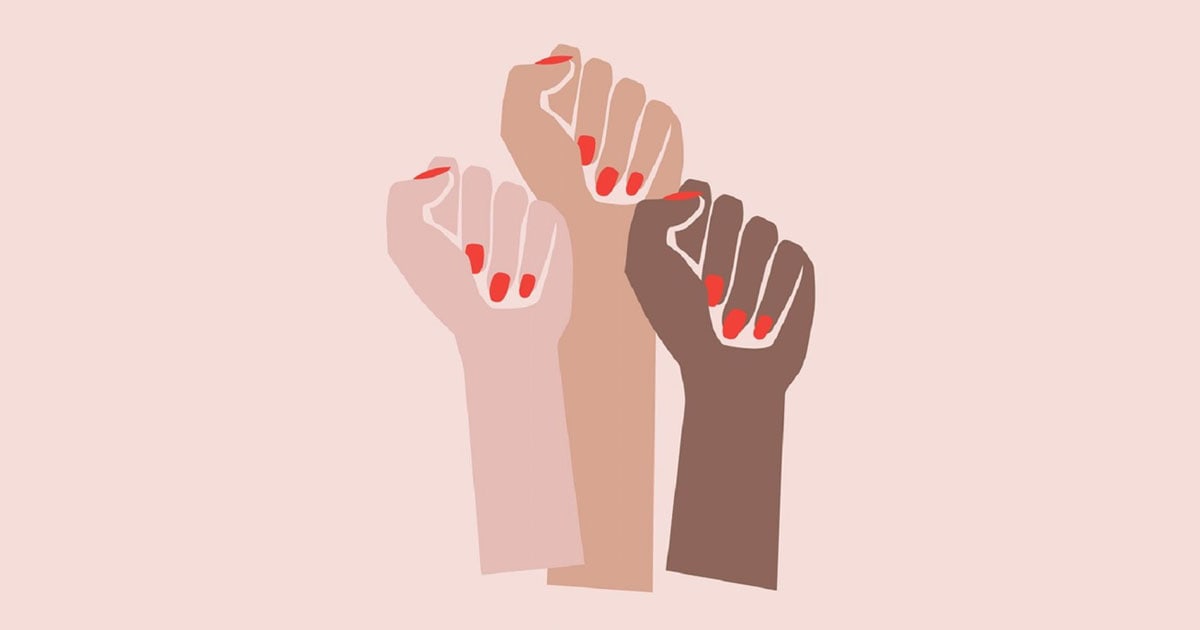9 Feminist Hashtags That Changed The Way People Think

Since Twitter was born over a decade ago (!), the platform has gone through many different eras, and is now a vital social platform for discussion—social justice discussions especially.
Hashtag culture has changed the way we think and communicate (and broadcast) about some of the most integral issues that exist.

Proof that technology truly can be used for evil or good.
The beauty of the hashtag lies in its accessibility; anyone with the right smarts can communicate, campaign, and even educate effectively, making it a particularly powerful tool for change among marginalized people (i.e., women in general and women of color in particular).
Although hashtags began their journey on Twitter, their infectious effects have since extended to many other social media platforms.
Here’s a lucky list of 9 of feminism’s finest hashtags from the last few years that really made waves when it comes to the way people think about gender and sexuality:
1. #RapeCultureIsWhen, 2014
Writer and political analyst Zerlina Maxwell was inspired to create #RapeCultureIsWhen after Time published this essay titled: “It’s Time to End ‘Rape Culture’ Hysteria.”

No fucking joke.
Aim: to draw attention to all the ways society blames victims/survivors of assault and rape.
A survivor of assault herself, Zerlina shared her own experiences of rape culture, like being asked what she was wearing after her rape.
Following in her footsteps, thousands of other women worldwide began using the hashtag as a safe space to share their lived experiences and damn status quo rape culture.
2. #BlackGirlMagic, 2013
In 2013, CaShawn Thompson started tagging #BlackGirlsAreMagic (often shortened to #BlackGirlMagic), to celebrate the beauty, power and strength of black women.
It took right off (where there’s a need…), and has become a full-on cultural phenomenon.
In 2016 President Obama and ballerina Misty Copeland even got together to discuss the beauty of black girl magic publicly.
3. #WhyIStayed, 2014
Writer Beverly Gooden first penned this hashtag when she shared her own disturbing personal story of domestic abuse and survival over a series of tweets.
Gooden's tweets inspired other women to share their own complex stories, in order to ultimately bring exposure and awareness to the dynamics of domestic abuse. Which, rightly, also inspired the hashtag #WhyILeft.
4. #GirlsLikeUs, 2012
Author and activist Janet Mock launched her #GirlsLikeUs campaign to shed light on and promote awareness about the issues specific to trans women.
The hashtag has also since become somewhat of a safe space for trans women to stand in solidarity with each other, and celebrate their victories.
5. #MasculinitySoFragile, 2013
Popularized by UK writer Anthony Williams, #MasculinitySoFragile started getting a lot more attention when it began trending on Twitter in 2015.
Using humour to challenge the social norm around what it means to “be a man," the hashtag encourages people of all genders to draw attention to some of the nonsensical ways society asserts and enforces these norms.
6. #EverydaySexism, 2015
The quintessential #EverydaySexism began circulating after author Laura Bates, also founder of the The Everyday Sexism Project, encouraged people to share their stories of daily, subtle, sexist microaggressions.
Thousands participated, and have continued to share their stories using the tag, highlighting the ways sexism affects every last one of us.
7. #EffYourBeautyStandards, 2015
Plus-sized model/queen Tess Holliday created #EffYourBeautyStandards and started an online movement for body positivity.
It took off across Twitter and Instagram, with women from all over the world sharing proud, fierce selfies that celebrate and accentuate their curves and boldly challenge the notion that skinny is the only way to be hot, beautiful, or sexy.
8. #PinkTax, 2016
#PinkTax calls attention to the higher cost of "female" products, including everything from razors, shaving cream, tampons, and children's toys.
A New York City Department Of Consumer Affairs study revealed that women pay more for the same product 42% of the time, and are also victims of the "shrink it and pink it" ideology, wherein manufacturers charge more for less product after it’s been placed in "female-friendly" packaging.
Time to #SinkThePinkTax.
9. #ShoutYourAbortion, 2016
I’m embarrassed to be human when I think about the fact that abortion is still a controversy.
So it’s no surprise then, that this pro-choice hashtag went absolutely viral.
When American politicians threatened to block funding to Planned Parenthood, journalist Lindy West shared her own abortion tale on Twitter, stating: “The campaign to defund PP relies on the assumption that abortion is to be whispered about. #ShoutYourAbortion.”
West encouraged women to share their own story—however traumatic or personal—to show that abortion is a human right and that women should not be ashamed of the decisions they’ve made, have had to make, and continue to be faced with.
Keep on fighting the good fight, sisters.



